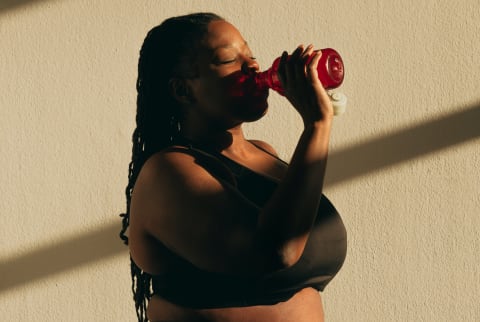“Beauty supplement” is a bit of an elusive term. By definition, they’re capsules, powders, gummies, or liquids with healthy ingredients for skin, hair, and nails, but so many ingredients can fall under this umbrella.* (We explain all the ingredients to look for here, if you’re curious.) Not to mention, it can be difficult to comb through the labyrinth of brands and manufacturers out there and cut through all the marketing noise.
Not to fret: We chatted with mbg’s director of scientific affairs and in-house nutritionist, Ashley Jordan Ferira, Ph.D., R.D., about some of the biggest red flags. A product developer herself and expert in the field, she has a few tips in mind when searching for beauty supplements. “Let’s talk about a few of my pet peeves,” she shares on this episode of the mindbodygreen podcast:
What are excipients, you ask? Turn your product over, peer at the ingredient list, and take a look at the “other ingredients” section. Those are your excipients: the nonactive players in your supplement.
According to Ferira, “Lazy formulators create lazy excipients. These are things like artificial sweeteners, synthetic colors or dyes, soybean oil… There have been alternatives for these for a long time. When I turn over a product and see synthetic blue dye, red dye, titanium dioxide—that was money savings, and that’s lazy. You can do that in a cleaner way.”
cellular beauty+
Cellular beauty has arrived with this revolutionary formula.*

Although, we should note that some of these formulators aren’t necessarily lazy—they may genuinely be unaware. Take leucine, a wonderful amino acid featured in mbg’s cellular beauty+, a vegan supplement: Leucine is often sourced from duck feathers or human hair—two things you don’t necessarily want in your daily supplement. “We intentionally sourced a plant-based, fermented, natural source of leucine,” notes Ferira. “Sometimes manufacturers just don’t even know to dig that deep.”
Sounds magical, but according to Ferira, it’s just plain annoying. By “fairy dusting,” she refers to manufacturers and brands that use less-than-efficacious doses (on purpose) just so they can say a specific premium ingredient exists in their supplement.
“Astaxanthin, or lycopene, or lutein, even with CoQ10 or ceramides—these are expensive raw ingredients,” says Ferira. “And so they can often be folded into something called a proprietary blend, which usually lacks transparency regarding how many milligrams or grams of each ingredient is in that blend.”
That’s why, says Ferira, it’s important to familiarize yourself with the science and the supplement’s ingredient list. For example, studies of astaxanthin tout 6 milligrams for the strongest skin care benefits (like hydration, elasticity, and wrinkle reduction)*, so you might want to look out for brands who market astaxanthin in their supplement with non-efficacious doses.
This question makes Ferira’s skin crawl: “Is your collagen vegan?” It’s a common query, but let’s bring everyone up to speed: There is no such thing as vegan collagen. Yes, there are vegan ingredients that support collagen health—like vitamins C and E for collagen synthesis or botanical antioxidants to protect the collagen you have from oxidative damage—but the actual collagen itself cannot be sourced from plants.
beauty & gut collagen+
The one-step beauty routine for youthful skin, healthy hair & strong nails.*

“Anything that is marketing itself as a ‘vegan collagen,’ it does not have collagen inside of it,” says Ferira. “That would be like saying, ‘Go drink some vegan bone broth’—it is not ever going to be vegan. Collagen comes from cows, chickens, and fish.”
That’s not to say you can’t source it in a responsible and high-quality way (we source ours from grass-fed, pasture-raised Brazilian cows), but, sorry to say, it’s not vegan. “Let’s go ahead and bust the mythical unicorn that is ‘vegan collagen.’ It doesn’t exist,” adds Ferira.
When it comes to browsing for beauty supplements, these are Ferira’s biggest red flags. With her pet peeves in mind, you can become a more critical shopper and select the most high-quality option possible.
If you are pregnant, breastfeeding, or taking medications, consult with your doctor before starting a supplement routine. It is always optimal to consult with a health care provider when considering what supplements are right for you.










